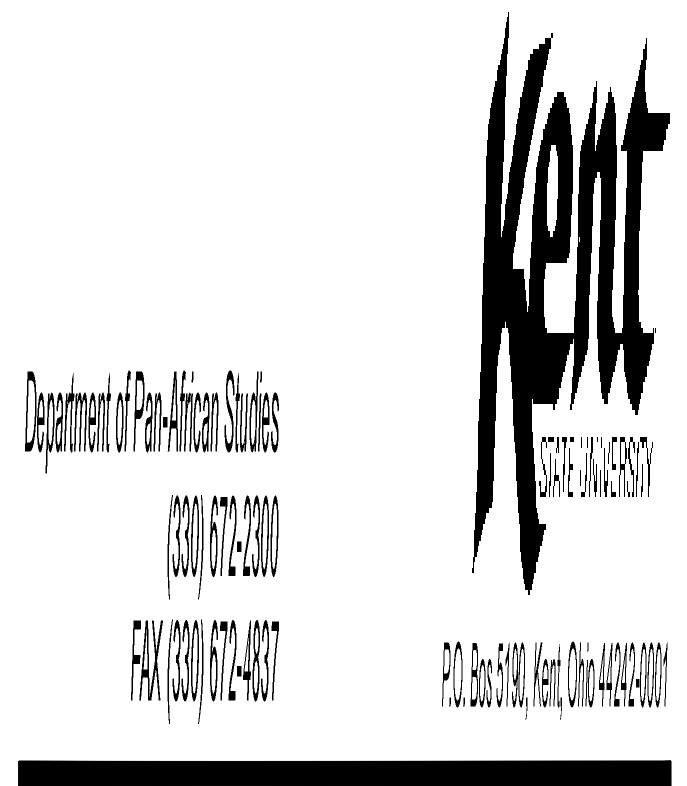
December 16, 1996
Dr. Joseph H. Danks, Dean
College of Arts and Sciences
Kent State University
Kent, Ohio 44242-0001
Dear Dean Danks:
It is indeed unfortunate that for the first time
in over 27 years of existence the undersigned faculty of the Department
of Pan-African Studies have come to the conclusion that it can no longer
tolerate the injudicious invalidation of faculty governance policies and
procedures itemized in the Collective Bargaining Agreement as promulgated
in 1995, the University Register, and the Department's Faculty Handbook
(approved by the College of Arts and Sciences in 1984 and revised in 1993
or l994). The AAUP Chapter has been informed that we have discussed our
grievances with the provost and you as dean. While you, Dean Danks, have
been sensitive to our dilemma, we cannot say the same about some members
of the central administration who resorted to threats or treated our complaint
with benign neglect. Furthermore, it should be noted here that the large
number of policy violations committed by Dr. Garrison are conditioned by
his seeming total lack of the administrative skills required of the chair
of a complex Department similar to our own, his lack of familiarity with
the mission of Africana Studies in general, and the Department of Pan-African
Studies in particular. Even though this is not the place to list each and
every violation the chairperson, Dr. George R. Garrison, has committed;
we feel it is incumbent on us. however, to list some of his most flagrant
abrogations of policy. This is what follows:
-
Dr. Garrison usurps all the FAC's ability to recommend,
after interviews, new faculty and staff hirings. In some recent instances,
the chair has issued letters of hire before the FAC has a chance
to interview candidates. On other occasions, he has failed to carry out
his responsibility to inform his faculty about research council research
opportunities, faculty development research awards, i.e., sabbaticals,
intercession and summer teaching possibilities;
-
Dr. Garrison fails to keep himself adequately informed
about the University's tenure and promotion procedures. This is conditioned
by his refusal to read his mail and/or respond to deadlines. For instance,
documents requested by the College dean are as a standard practice turned
in late. This is currently the case in the instance of the Annual Mission
Report, which was due in September/October, but, as of yesterday, had not
yet been turned in; Dr. Garrison persists in assigning individuals to teach
courses after the Department's curriculum committee has deemed the individuals
incompetent. In spite of the faculty's objections, the chair dismisses
the complaints by saying that the Department is not a democracy, that his
judgement is the only judgement that must be responded to;
-
Dr. Garrison has a habit of making decisions impacting or committing the
Department and its faculty/staff without first seeking the faculty/staff's
advice or consent. In fact, on two separate occasions, when the faculty/staff
raise an issue concerning departmental governance, the chair called
on the advice of those outside the Department (many of whom aren't even
faculty and have scant to no knowledge of the Department's mission much
less the intricacies of Department's administration) to protect him from
the criticisms the faculty/staff raised against him;
-
Dr. Garrison, in response to faculty members challenging
him in faculty meetings, has unilaterally decided to bar emeritus faculty
and the Department's graduate assistants from all faculty/staff meetings.
Of great concern to us is the fact that he still allows undergraduate
officers of the Black United Students to attend all meetings.
As mentioned earlier on, Dr. Garrison must be extraordinarily
reviewed for the numerous violations of University policy as outlined in
the Collective Bargaining Agreement, the DPAS Faculty Handbook, and the
University Register. Among the violations of policy not mentioned above
are the following: (1). disregards nonreappointment and dismissal procedures;
(2). fails to properly allocate academic staff; (3). ignorant of and disrespective
of departmental curricular program and/or program development and discontinuance;
(4). Vitiates policies governing faculty evaluations relative to salaries
and merit increases; (5). fails to follow established budget priorities
and guidelines; (6). unaware faculty teaching areas and service on departmental,
university and community-based committees; (7). believes the establishment
and maintenance of the academic unit handbook are not his responsibility;
(8). refuses to insure that students are properly advised; (9). disregards
previously established instructional quality standards; and (10). flounts
his responsibility to insure that class schedules and sizes, office hours
are held and associated duties of faculty members.
Sincerely,
/s/ Dr. Francis E. Dorsey
/s/ Dr. Jacqueline Rowser
/s/ Dr. Diedre Badejo
/s/ Prof. Mwatabu Okantah
FED:gb |
